In a week when BP's involvement in Russia once again raised concern among investors, the City can draw consolation from the fact that chief executive Bob Dudley is a veteran of the country's perilous politics.
In 2008 Dudley was the boss of the oil and gas group's profitable joint venture, TNK-BP: an uneasy alliance with four Russian oligarchs. In July that year he was forced to flee the country as he warned of an "orchestrated campaign of harassment" amid expectations he could be seized on trumped-up visa charges.
This time, Dudley faces questions over the BP's near-20% stake in Rosneft, the Kremlin-controlled oil group that has been dragged into the latest round of EU sanctions through restrictions on the export to Russia of hi-tech equipment for extracting fossil fuels. The shareholding in Russia's largest oil group is a legacy of BP's exit from TNK-BP, when BP sold its shareholding in the joint venture to Rosneft.
Fadel Gheit, an oil analyst at the New York-based Oppenheimer brokerage, says that Russia has been one of the best investments ever made by BP. But the investment community is always wary of the place.
"The fact is that BP has always been willing to take calculated risks whether its going into Russia, through its extensive trading activities or running its balance sheet at a high level. It works for them. It's a spicy food. Some like it hot." Dudley, who was raised in Mississippi but experienced many ice cold Moscow winters, is clearly one of them.
In the wake of his Moscow flight, Dudley not only stayed with BP outside Russia but ended up winning the top job inside the company. He replaced Tony Hayward following the Deepwater Horizon accident in the Gulf of Mexico of 2010, then went on to mastermind an astonishing rapprochement with Russia through the TNK-BP share deal with Rosneft.
If that move – consummated last year – looked then like a brave personal and corporate move for Dudley and BP then it looks today like an dangerous gamble, some would argue.
On top of the sanctions threat, this week Europe's most senior arbitration court ruled that a significant amount of the assets held by Rosneft had fallen into its hands following an illegal expropriation of holdings belonging to another privately-owned oil group in Russia, Yukos. A group of investors, who have been awarded $50bn (£30bn) worth of damages by the court in the Hague court, has already warned it may come looking for BP to secure payment. On Thursday the European court of human rights ordered that a further €1.9bn (£1.5bn) in compensation should be paid to former shareholders in Yukos.
But Russia has always held a great allure for BP. The group's first half financial results this week gave a glimpse why, with a profit share and dividend payment from Rosneft worth over £1.3bn.
And Dudley remains convinced that his move to sell up the stake in TNK-BP and accept some of the proceeds through a stake in Rosneft was the right thing to do. "We absolutely stand by strategically what we have done. We are very, very long-term investors. We work in countries that have ups and downs."
But at the same time the company spelled out the risks facing it. "If further international sanctions are imposed on Rosneft or new sanctions are imposed on Russia or other Russian individuals or entities, this could have a materially adverse impact on our relationship with and investment in Rosneft, our business and strategic objectives in Russia and our financial position and results of operations," it said in a statement.
BP is not alone in its interest in Russia with ExxonMobil, Total and many other of the western oil "majors" holding joint ventures or other important ties with either Rosneft, Gazprom or another local players. Russia after all holds the largest gas reserves in the world and the third largest producer of oil after Saudi Arabia and the US.
Shell has a major commitment to the country, not least through its liquefied natural gas (LNG) scheme at Sakhalin in eastern Russia but other companies have recently signed deals to explore for shale in Siberia and search for hydrocarbons in the Arctic.
Shell has had its own difficult experience in Russia when it faced a series of claims by the environmental watchdog that it had broken a variety of regulations at Sakhalin.
These claims stopped after it gave in to pressure from Gazprom to sell off part of its stake leaving many Western commentators to conclude the Anglo-Dutch group was being harassed for political reasons, something the Kremlin denied.
BP was encouraged to sell its stake in TNK-BP for an initial $12.5bn in cash plus an 18.5% stake – now raised to 20% – when its private sector partners succumbed to its own pressure from Rosneft. BP pointed out that it bought its original half share in TNK for $8bn and took $19bn in dividends over the years.
But there were those who wondered whether the tie-up with Rosneft was a good idea and whether it would have been done if BP had more options. The company was still reeling from the impact of the Macondo blowout and the billions of dollars that it had been forced to pay out for clean up and compensation.
North America is still its single most important region – as well as a key investor base – and yet BP had seriously damaged its reputation with the fire at the Texas City refinery, a nasty pipeline fracture in Alaska and then the Deepwater Horizon accident which created the worst environmental disaster.
While many companies such as Shell have moved into the Arctic as a new frontier for oil and gas, BP pulled out of Greenland amid speculation that its involvement would be inflammatory in the eyes of Greenpeace and others.
Instead the group, whose share price yet to fully recover from Deepwater accident, has concentrated its fire power on places such as Azerbaijan, Angola and Iraq as well as rebuilding operations in the Gulf of Mexico where it remains the biggest single operator.
BP shares are still trading on a near 20% discount to the rest of the sector but City analysts said project delivery and the threat of sanctions against Moscow remain key risks.
Neil Morton, at Investec Securities, noted drily after the cheerfully good first half figures that "reading BP's quarterly results is arguably a more useful exercise for law students than for financial investors. Russia has now been added to the litany of (mostly Macondo) legal risks."
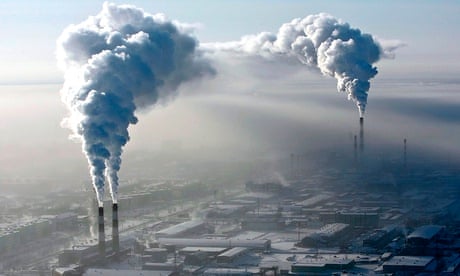

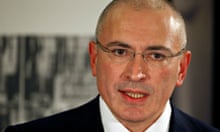

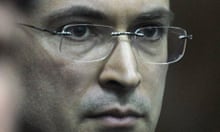

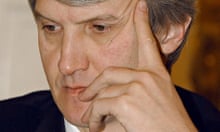
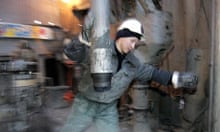
Comments (…)
Sign in or create your Guardian account to join the discussion